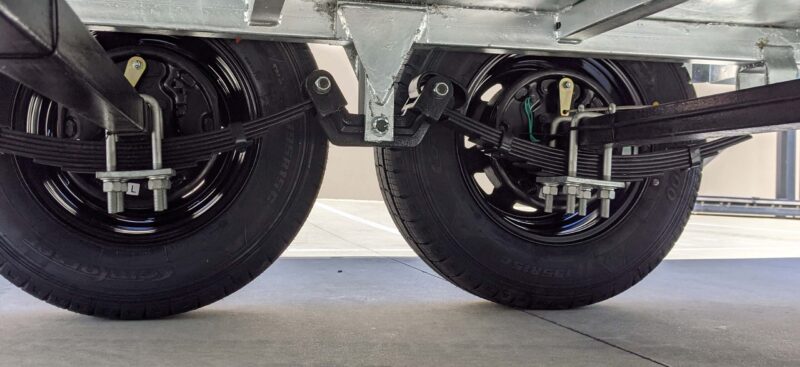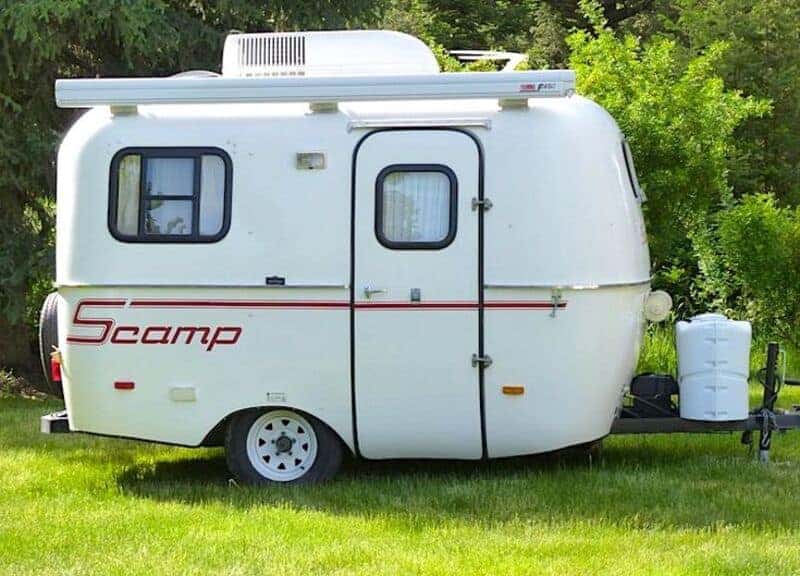One assumption that we make as RV owners is that campground and RV park hook-ups are safe and work properly. However, this is not always the case, and you need to take simple steps to protect yourself and your RV. As an RV owner, you should consider things like an RV surge protector, for added safety when connected to shore power.
Many of us see the price of an RV surge protector and pass it over because it can be expensive. But one good surge or drop in amps can fry your RV electrical system.
In this article, we will look at how RV surge protectors work and why they are a really valuable addition to your RV set-up process.
What Is An RV Surge Protector?
There is not much difference between a surge protector you plug your household electronics into and the one for your RV. They work to protect your devices and electronics against unexpected and damaging surges of electricity.
An RV surge protector is larger and, in some cases, will offer your RV protection from other electrical issues that you may experience while connected to shore power.
An RV surge protector is installed between shore power connections and the electrical inlet on your RV. RV surge protectors are designed to protect your entire RV electrical system from surges, not just a single appliance or electronic device.
RV surge protectors come in a couple of different operating styles. You can purchase those that only protect from surges. Or, you can purchase power management systems or electrical management systems. They protect from both surges and drops in amperage or voltage.
How Do RV Surge Protectors Work?
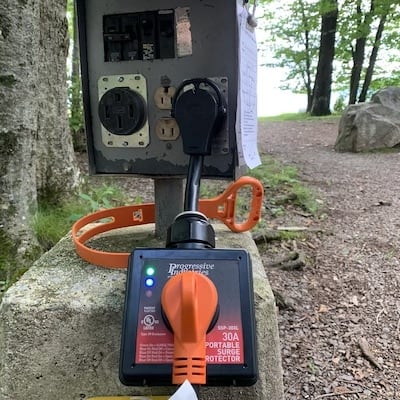
The basic job of the RV surge protector is to sacrifice itself to protect your RV’s electrical system from harm. The principles behind the operation of a surge protector are not complex.
RV surge protectors start with a line of Metallic Oxide Varistors or MOVs. These metal plates are designed to absorb a particular amount of joules of energy during a surge event. When a MOV has taken up its designed energy amount, it becomes “spent”. The next MOV in line takes the next surge or any energy that the first MOV was unable to handle.
Example 21OO Joule RV Surge Protector:
You purchase an RV surge protector with a 2100 joule rating. Inside of the surge protector, there may be seven, 300-joule MOVs. In this case, each MOV can manage 300 joules of surge.
Say you experience an electrical surge at an RV park that measures 900 joules. The first three MOVs in the surge protector will be expended blocking your RV from the surge. This leaves four more MOVs and 1200 joules of protection for your RV.
Many RV surge protectors will also have a fuse or reset between the power source and the MOVs. This feature is used to provide an emergency off-switch if a surge is large enough that it expends all of the MOVs at one time.
The fuse will “blow” or the reset will be tripped. This keeps any additional power from passing from the source to your RV.
When all of the MOVs have been used up, your surge protector will no longer be able to protect your RV. It will have an alarm or warning light to indicate that the unit is spent, and it is time to purchase a new one.
Do You Really Need An RV Surge Protector?
An RV surge protector may not be an essential piece of equipment for your RV. However, having one is highly recommended and well worth the cost.
What many of us forget when we travel from RV park to RV park is that many are older and may not have updated electrical grids. The system may have been designed in the 1970s when the electrical code was different.
When you start parking numerous large Class A RVs, travel trailers, and motorhomes in an older RV park, the risk for power surges or reduced amps increases.
A single large surge of electricity, whether it comes from poorly maintained power grids in an RV park, or a zap of lightning can fry your RV’s entire electrical system. If this happens, your only choice is to have the electrical system of your RV completely redone. This is costly and could have been avoided with a simple RV surge protector.
The other concern with RV park and campground hookups is that, unless they are brand new, are likely not designed to handle a full house of air conditioners.
If a large number of air conditioner units are turned on at the same time, this draw of power can reduce the amps available for your RV, which can also damage portions of your electrical system. In this case, a power management device can help monitor low amperage and protect your RV from this drop in power.
Certainly, you can live life on the wild side, and skip the RV surge protector. However, in the long run, it is a cost-effective way to protect your investment from expensive electrical repairs.
Are All Surge Protectors The Same?
We have hinted at this a bit already. Not all RV surge protectors are the same. Some are quite basic, and others can be very complex.
30 Amp vs. 50 Amp Surge Protector
The most basic difference you’ll find in RV surge protectors is the designed amperage capacity. You will find 30-amp and 50-amp offerings. It is best to select the amperage that matches your RV’s electrical load.
If you need to purchase an RV surge protector that does not match the RV power, there are alterations you need to make in how you use power in your RV. We will cover this topic more later in this article.
Surge Protector vs. Electrical Management System (EMS)
Some RV surge protectors are just that – a surge protector. If you want further protection from reduced amps, faulty grounding, or wiring, you will want to look for a power management device.
These are surge protectors, plus they protect low amps. They give warnings if the electrical source is not properly wired or has a faulty ground.
Fused or Non-Fused
Another simple difference you may note in RV surge protectors is some have a fuse that will blow under a significant surge, others may have a reset button. Older surge protectors tend to have fuses while newer ones have reset buttons.
Both work the same way, but if the fuse on your surge protector blows, it will need to be replaced. This means carrying a spare or two in your RV tool kit.
Portable vs. Hard Wired Surge Protector
Finally, there are two options for how the surge protector is connected to your RV. You can purchase options that plug into the shore power and then plug into your RV. These temporary surge protectors are a great option if you do not want to mess with your RV’s electrical system.
The other option you have is a surge protector that is hard-wired into your RV. These are handy because you do not have to remember to plug them in. However, they can be more difficult to replace when they are spent.
Can You Use A 30 amp Surge Protector On A 50 amp RV?
What happens if your only surge protector option does not match the power of your RV? Many RV owners will consider skipping the surge protector, risking potential damage to their RV. However, it is important to know that you can use a surge protector that does not match the power of your RV.
If you need to use an RV surge protector that does not match your RV power requirements, the first thing you will need to do is acquire the proper adaptors. Power adaptors will allow you to use the RV surge protector you have without damaging your RV’s electrical system.
You will need to manage your power use in these instances. If you have a 50-amp RV electrical system but only have a 30-amp surge protector, you will need to take steps to reduce your power consumption. This may mean not using your air conditioner, turning off your television, or unplugging electronics.
On the other hand, if your RV is a 30-amp electrical system, but your surge protector is for a 50-amp service you will need to be mindful about not overloading the RV’s electrical system. Overloading your electrical system can cause damage to appliances, electronic devices, and the overall electrical system for your RV.
What’s The Best RV Surge Protector?
If you are shopping for your first RV surge protector, you may be wondering which options are the best or most reliable. There are lots of options on Amazon or other online shopping sites, but there are three popular brands that most RVers find to be high-performing and reliable.
1. Hughes Power Watchdog
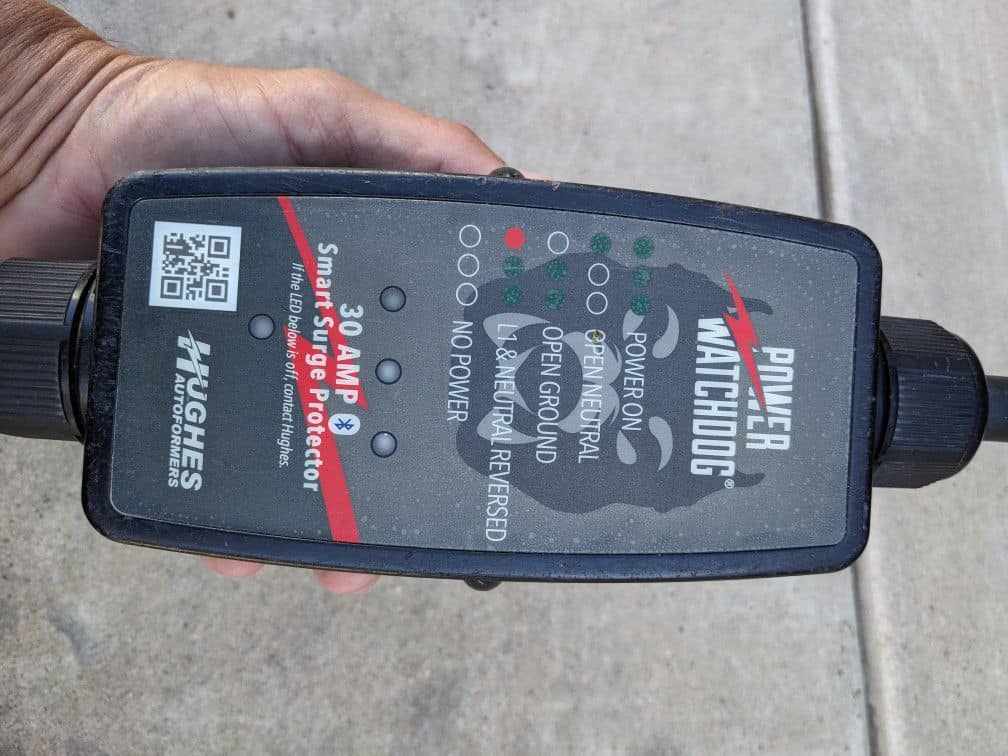
Hughes Power Watchdog is a simple-to-use option that comes with a bunch of great features. The power watchdog comes in 30 and 50-amp options, with surge units that can be replaced, instead of having to replace the entire surge protector.
This product monitors source power conditions and alerts you to any problems that may be present. It also has real-time monitoring on the Power Watchdog app, thanks to Bluetooth connectivity.
One great thing about Hughes is that if your surge unit is expended within the first two years of owning their product, they will send you a new surge unit, free of charge.
2. Progressive Industries
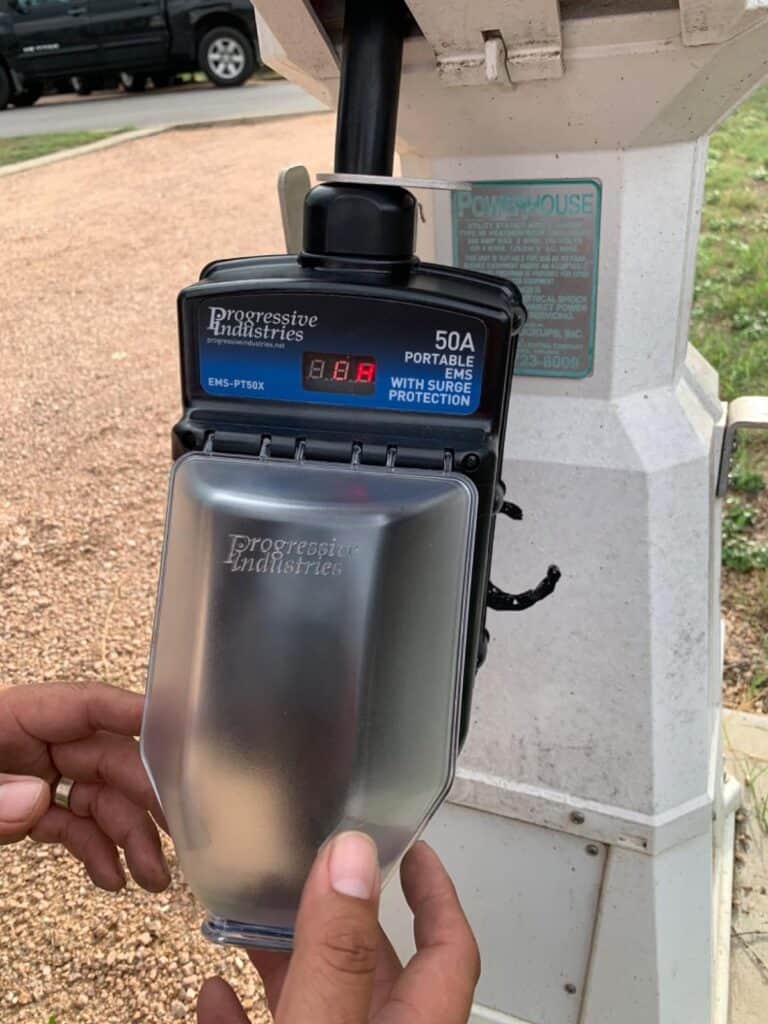
Progressive Industries offers a range of RV surge protector products, ranging from basic surge protectors to high-tech electrical management systems (EMS). A great middle-of-the-road option from Progressive Industries is their portable EMS.
These are available in 30 and 50-amp options. They are plug-and-play electrical management systems that protect your RV from a wide range of power conditions that you may encounter at RV parks and campgrounds.
They have a lifetime warranty for manufacturing defects which is a great feature. If a surge event sacrifices your EMS, you will need to purchase a completely new surge protector. They do not offer replacement parts or surge units.
3. Southwire Surge Guard
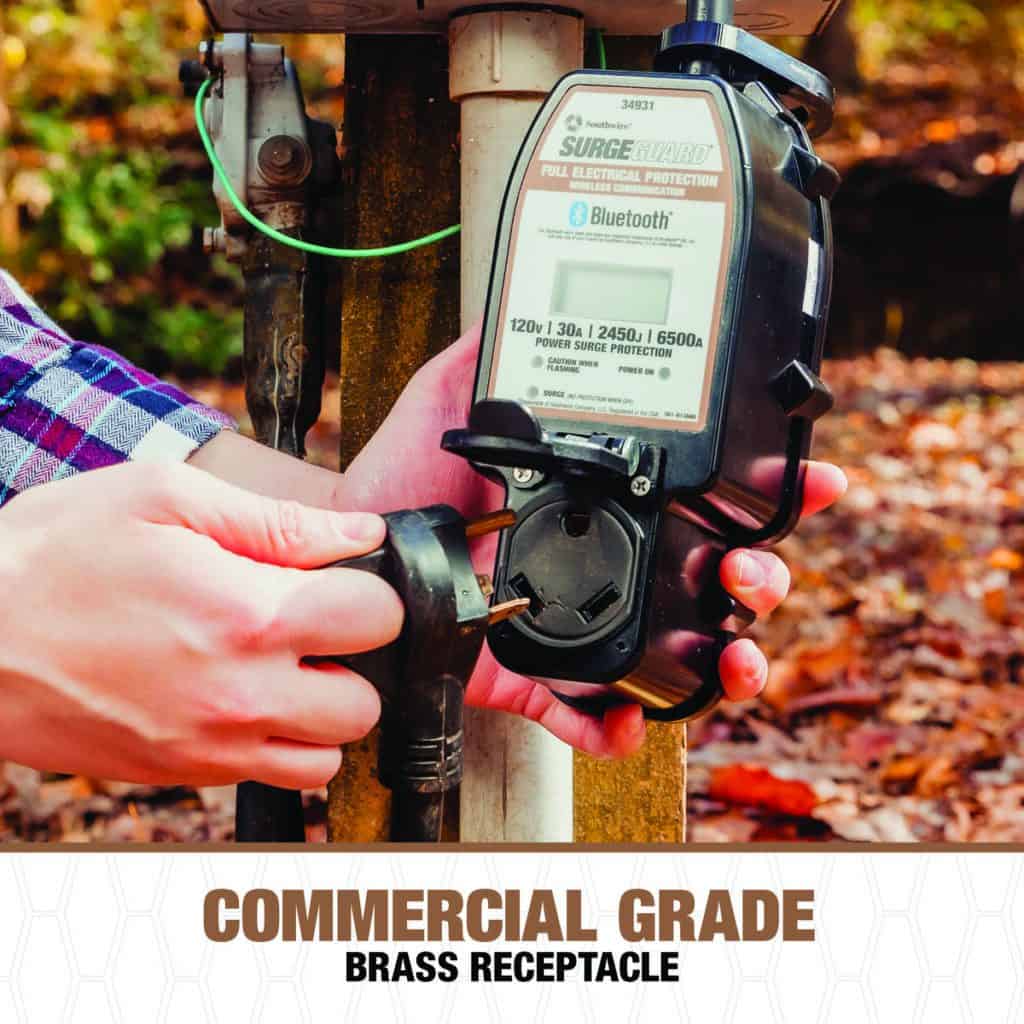
Southwire Surge Guard is another great product that is a favorite of many RVers. Their surge guard line offers basic surge protection at a reasonable price.
These units are great for protecting your RV from faulty wiring, low and high-voltage events, and improper grounding conditions. If you are looking for a good product but do not want all of the added extras, Southwire Surge Guard is a good option.
Southwire also offers a wide range of power management systems along with its surge guard line.
Why Do People Steal RV Surge Protectors?
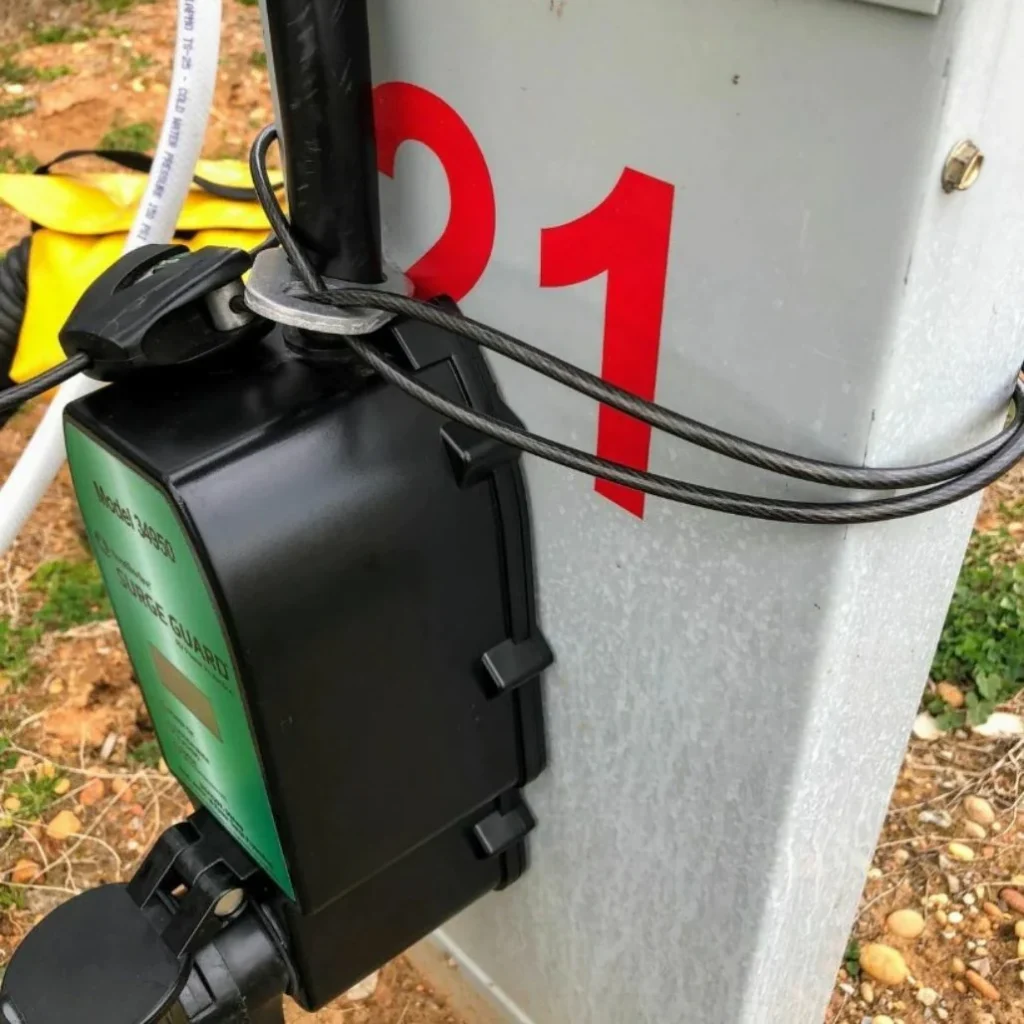
While we want to think that RV parks are safe places and our fellow RVers are good people, there are some bad eggs out there. RV surge protectors have become an item with a high theft rate.
There are several reasons why someone might want to steal your RV surge protector, but most of the time it comes down to one reason – RV surge protectors are expensive, and they are easy to steal.
To protect your RV surge protector from theft, we recommend you consider locking the surge protector to the electrical service or to your RV. Many RV surge protectors have a lock ring that makes it easy to lock your surge protector and keep it from being a target of thieves.
Mike and Susan of RVBlogger put a green trash bag over their power pedestal and duct tape it at the bottom, which hides the surge protector from view. It also keeps the rain off of the power pedestal and the surge protector.
Final Thoughts About RV Surge Protectors
Though you may not have experienced a surge event at an RV park or campground, at some point, you will.
With electrical infrastructure at many RV parks being old and ill-equipped to handle the load from numerous large RVs, more and more surge and low power conditions are occurring and causing damage to RVs. An RV surge protector is a simple way to protect your RV electrical system from damage.
You do not have to spend a ton of money to purchase a good quality surge protector. However, if you want more protection from other potential electrical conditions, a more advanced power management device is a great investment.
No matter the option you select, an RV surge protector shields your RV and wallet from costly electrical system repairs.
Related Reading:
– 17 Essential RV Spare Parts To Consider
– 10 Most Common Travel Trailer Repairs And How To Avoid Them
– Should You Use Dielectric Grease On Trailer Plugs?
– How To Replace A 7-Pin Trailer Plug
About the Author:
Jason Gass is a full-time freelance writer and part-time RVer whose goal is to share great stories around a campfire with good friends.
When he’s not working, he spends most of his time camping, searching for the best breweries, and road-tripping in his teardrop trailer with his wife, daughter, and two dogs.



